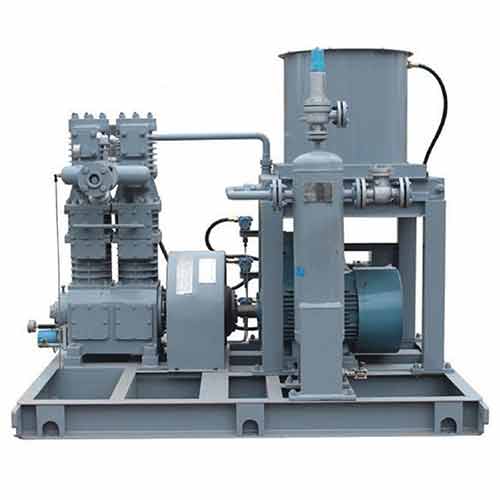A biogas compressor is a specialized type of compressor designed for handling biogas, a renewable energy source produced through the anaerobic digestion of organic materials such as agricultural residues, food waste, and wastewater.
The primary component of biogas is methane, along with other gases like carbon dioxide and trace amounts of hydrogen sulfide. As the demand for environmentally friendly energy solutions continues to rise, our biogas compressor is a testament to efficiency, reliability, and a commitment to a greener future.
Features & Characteristics:
Key Features and Components of a Biogas Compressor:
- Gas Inlet: Biogas, generated from the anaerobic digestion, enters the compressor through the gas inlet. This gas typically contains methane, carbon dioxide, and other impurities.
- Compression Chamber: The compression chamber is where the gas compression occurs. The compressor increases the pressure of the biogas to the desired level for efficient storage, transport, or utilization.
- Gas Outlet: The compressed biogas exits the compressor through the gas outlet. It is then ready for use in various power generation, heating, or transportation applications.
- Seals and Gaskets: Given the composition of biogas, which may include corrosive elements, special seals and gaskets are often incorporated to ensure a tight seal and prevent leaks.
- Materials Compatibility: Biogas compressors are constructed with materials resistant to corrosion and degradation from the potentially corrosive elements present in biogas.
- Cooling System: To manage the heat generated during compression, biogas compressors may include a cooling system. This could involve air or water cooling to maintain optimal operating temperatures.
- Explosion-Proof Design: Biogas can be explosive when mixed with air in certain concentrations. Therefore, biogas compressors often feature an explosion-proof design with safety measures to mitigate the risk of ignition.
Applications of Biogas Compressors:
From power generation to transportation, our compressor is engineered for versatility, offering remote monitoring, safety compliance, and a compact design.
- Power Generation: Compressed biogas can be used as a fuel for power generation in engines or turbines. Biogas power plants often use compressors to increase the pressure of biogas before it is fed into the power generation system.
- Vehicle Fuel: Biogas, when compressed, can be used as a clean and renewable fuel for vehicles. Compressed biogas (CBG) is an environmentally friendly alternative to traditional fossil fuels.
- Injection into Natural Gas Grids: Compressed biogas can be injected into natural gas pipelines, contributing to the renewable energy content of the overall gas supply.
- Storage and Transportation: Biogas compression is essential for efficient storage and transportation. Compressing biogas increases its energy density, making it more practical for storage in tanks or transportation to end-users.
- Wastewater Treatment Plants: Biogas generated from wastewater treatment processes can be compressed on-site or transported for use in other applications.
Biogas compressors play a crucial role in maximizing the utility of biogas as a renewable energy source, contributing to sustainable energy solutions and reducing reliance on conventional fossil fuels.

